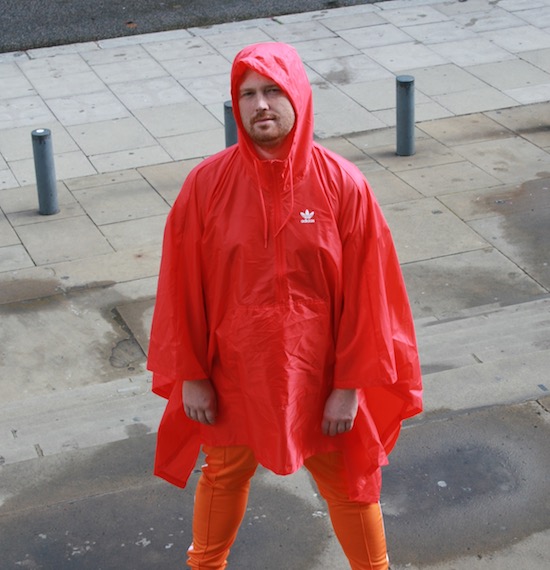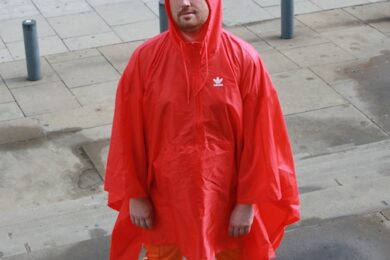Portrait by David Keen
I first saw Dale Cornish standing at a urinal with his cock out. It was 2005 and the lo-fi music video for No Bra’s ‘Munchausen’, a hilarious and absolutely banging (especially in its remixed form) satire on art student pretentiousness, more of which below. This evening, Cornish is preparing for a set at Cafe Oto with a lamb shish, the eating of which is interrupted by his brilliant laugh that cracks against the plaster of paris rocks of the Stone Cave restaurant in Dalston, where golden stalactites – or perhaps shiny turds – hang down from the ceiling. During the interview Cornish’s cracking laugh frequently troubles the plaster, from when I ask why he was once called "the Tilda Swinton of electroclash", to an enquiry about his love of Croydon ("Somebody once insulted Croydon and called it the Manhattan of Surrey") and digressions about dress down Friday at his day job regarding whether perhaps the ultimate outfit would be a top hat and speedos. Oh, and when ordering drinks: "It’s very V&A members room isn’t it, sparkling water." The ready humour hangs over Cornish’s circuitous musical route through music, from electroclash DJ and No Bra to collaboration with Phil Julian and the forthcoming solo record Enhex, the fifth in a series of albums that began with 2012’s Glacial. “The intentions behind each album are explorations of space, silence and a/rhythm,” Cornish tells me. “Each album I’ve done has a theme, but these are super personal to me. Not a tortured exploration of my psyche, though, just references and a common theme running through them.”
Music from Enhex might, or might not, be aired at Cornish’s forthcoming appearance at Newcastle’s Tusk Festival. Post-shish at Oto tonight, he’ll warm up a room of sports goths in for Cremation Lily with a solid, rubbery set of physical electronics that sits somewhere between noise and a heavier take on minimal techno. He will do this wearing a fine orange sportswear poncho, making asides to the audience through the mic and finishing the set by ripping out the power cables and running to the loo. It silences the packed room, and is at once unsettling and hugely fun. Then again, Cornish has being an entertainer in his genes.
His grandfather was a self-taught but eventually professional classical musician, playing the violin, cello and saxophone on cruise ships, at Butlins, posh hotel lobbies. "They’d have diplomats staying, like the Hungarian ambassador, and he would want to some traditional music, and my grandfather had this huge memory for tunes,” he recalls. Cornish subsequently grew up on an inherited diet of classical music, Madonna’s Immaculate Collection, the Pet Shop Boys and Whitney Houston, all of which fed into a teenage epiphany. "When I went to college and did my A-Levels, my art teacher was friends with one of Coldcut, and he said that they were starting to make music on laptop computers. I thought, ‘Fuck, that sounds really interesting, because I don’t have any musical training. I can count to 16, four fours but [that’s it].’ Hahahahaha!" All this made Cornish "interested in playing with sound". He bought a computer programme at a garden centre in Warlingham (reasonably priced at a tenner), which was the first time he played with sound.
Cornish started DJing in 1999 – "it was the foundation of my practice", he says, half mocking the tone of the serious electronic musician, "I just thought ‘why not? I get to inflict my taste on other people". He was also briefly in a band called Squashfox, a Mr Bungle-inspired affair that played a couple of gigs at the Croydon Cartoon and featured "badly triggered samples and I just shrieked a bit".
It was on the glorious wave of queer eclecticism that arrived in London with electroclash and the bright, smart pop music of the early 2000s where Cornish really got going. He spun fabulous tunes at Wednesday night institution Nag Nag Nag more times than anyone aside from DJ Hell and the residents, and went as a punter every single week, from the early days of 20 people in the room to the queues around the block when it moved to the Ghetto. "I made a different outfit every time, I really liked it because it was so eclectic, you’d hear completely random stuff,” he says. “It confirmed things for me, that you don’t have to be in this one blinkered thing. I never really had that tribal affiliation, the indie kids and the pop kids or whatever."
It’s a world away from what a friend of mine calls "avant trainer music", the self-conscious but actually rather bland new wave of post-genre club music. Cornish cracks up, "avant bumbag music…. I don’t want to be bitchy but [that trend] does just remind me of being seven and going to the Brighton Sea Life Centre and Mrs Jones our primary school teacher made us wear our bumbags over our shoulders rather than round our waists, because she wanted to make sure we weren’t losing stuff."
Cornish isn’t keen to talk about "the band that shall not be named", there’s a long pause and a sharp "yes" when asked if No Bra split over traditional creative differences. Cornish co-wrote the music and lyrics for ‘Munchausen’, that cock out at the urinal track. Music and humour, and especially satire don’t always sit well together, but that was a masterpiece, two languid-sounding art types stood trying to out-cool each other as they pissed, each ludicrous claim punctuated by an, "Oh really." Now 13 years old it’s a track that weirdly sounds more relevant today, in a world of desperately curated instagram feeds, lurid exhibitionism, and 24/7 personal brands. All you’d need is to add a few "sicks", I say. "Or ‘come through’, or ‘my G’, or avant bum bag," says Cornish. "Fucking hell".
After he left No Bra, Cornish joined various people he’d bump into a gigs to form Baraclough, a noise group described as "the gay Whitehouse", (they’re a group of whom Cornish is a great fan, saying of Philip Best, "what a babe, he does a ‘cunt’ wonderfully, it’s a verb, an adjective, a noun"). Again Baraclough was the product of eclecticism, the various members meeting at diverse gigs, from modern composition to Wolf Eyes. Coil remain a huge influence – "people thought they were total shit and you’d hear them being called ‘faggots’, and I’m so glad society has moved on that they’re recognised as the sonic geniuses they were". Cornish remembers seeing Sleazy and John Balance at LA3, a gay club at old Shoreditch queer venue 333, dancing to Shapeshifter’s ‘Lola’s Theme’. "I’d go there, tops off, for house music of a certain genre on a Sunday, and Coil would be there. It was amazing!" Yet even in this time of absorption, Cornish would get frustrated by the strictures and elitism of many he’d encounter. “The classical/experimental stuff was often the most conservative. I recall in my late teens going for a concert in my Croydon fineries to somewhere in London. There were a group of smarmy ‘new music queens’ – as the phrase goes – who were clearly offended by what I was wearing, (and perhaps by the fact someone not "in the know" was there, as it was always the same 20-50 people, almost all in academia). As I walked past one uttered the immortal line just within earshot, ‘I see we’re letting thugs into the concert hall these days.’ Cunt.”
It’s another refreshing example of Cornish’s honesty. His Twitter feed in particular is an amusing mixture of self-criticism and pointed asides that prick the pomposity of much contemporary electronic music. “Too many ‘artist statements’ are egocentric PR-obsessed creations to provide pseudo interesting background to boring work,” says Cornish. “I’d rather provide no background and have people enjoy it without stamping a block capitals this is what this means on it. People have often told me what they get out of it, anyway, which is more interesting than the text for an apologetic yet po-faced THIS IS WHAT THE ART MEANS pamphlet. Having said that… I’m going to contradict myself a little and say one or two of the tracks on Enhex use sounds which I’m calling ‘fake Foley’.”
How does the ‘fake foley’ fit into his music as it takes shape? Is it a matter of cutting down, or building up? "There’s never anything there to be begin with," Cornish says. "I never really understood that my music was minimal. It was only when people called it that, I went back and listened and thought, ‘I suppose it is.’ But if you listen to most pop songs they are just the same riff, so if you listen to ‘Bitch I’m Madonna’ – which has the dryest wikipedia page ever – you hear the whole thing in the first ten or fifteen seconds, apart from the bit at the end that sounds like when you thwhack a school ruler. It’s just my sensibility, that thing you can’t teach yourself. It’s not production. You can teach yourself how you’d get a really clean drum sound but this is about your whole aesthetic. You might find that, but you can’t learn it." It’s the innate Dale Cornish? "That sounds like an off-Broadway thing – a one night monologue."
Alongside Cornish’s disdain for pompous press releases full of sub-academic waffle, there’s a humour to his music. There’s something about the track ‘Pattern 4’ on Enhex where a vocal comes in and it’s weird and drunk and strange and quite funny, and then there’s things like his Gregorian chant performed live In Croydon Cathedral version of Whitehouse’s ‘Wriggle Like An Eel’…
"I think it’s because I don’t live and die by it. You’ll come back from a club in your electroclash or post-electroclash finery and have ‘faggot’ or ‘cunt’ yelled at you, so you have to have a sense humour. I’m not dressed head to toe in black and that’s not criticising anyone, but there is a certain ‘look’… I could have a really serious, business social media and twitter presence but I’m not [that sort of person]. I think you have to be yourself. There are certain people who you encounter who in real life are total pissheads and all over the place, but if you think of how they look on their record sleeves you’d think they’re some dark lord of minimal analogue bum bag techno. But it’s so easy to be yourself!"
So What keeps you motivated to make music? Why bother, essentially?
“In a world full of Mumford and Sons even existence is resistance,” Cornish says. “I know I’ll make music I like and some other people will enjoy, though hard to know how many. At the same time there’s no point in trying to pander to what you think people will want but people also seem more open-minded currently and up for the kind of music I make. Not that this is a historical anomaly: ‘O Superman’ was a number two single in the UK, and ‘Ghosts’ by Japan the most desolate top five entry ever, which no focus group then or now could ever have predicted. At the same time I’m a realist, considering there’s seven billion people and counting what I do is a niche of a niche of a niche in music. I was speaking about this with a friend recently, I think if you’re a creative you just do your own thing, even if no one else is paying attention. You just need to create.”
Dale Cornish plays the Tusk Festival in Newcastle this October. For more information, visit the festival website



